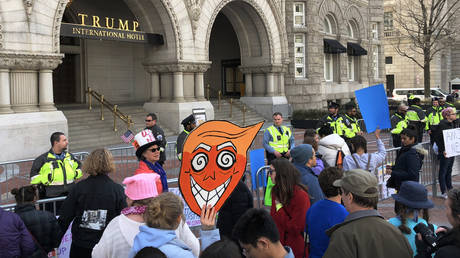Social media is clamping down on posts questioning US election results’ “integrity,” despite troubling anomalies. Yet questioning election integrity defined the establishment narrative for four years of relentless Russiagating.
Twitter, Facebook and YouTube’s crackdown on speculation about voter fraud, “election meddling,” and other “information intended to undermine public confidence in an election or other civic process” (as Twitter put it) represents a stunning about-face from the way they fostered – even bolstered – speculation about alleged Russian interference in the 2016 vote.
Also on rt.com FBI director says Russia is engaged in ‘very active efforts’ to sink Biden & rehashes 2016 claims… but provides no evidenceIn what is perhaps the ultimate irony, the current level of election meddling by the social media establishment – which outstrips anything the troll farm Internet Research Agency pulled off in 2016 by several orders of magnitude – would be impossible without the hysteria ginned up on these platforms by journalists casting doubt over the integrity of that year’s election. If not for four years of Russiagate, social media platforms would never have gotten away with choking off the flow of information about 2020’s election on the level they are.
Twitter has been steadily tightening its “election integrity” policy since 2016 in response to allegations that social media had served as a breeding ground for “Russian bots” and trolls who somehow convinced a massive swathe of the American electorate to vote for Republican candidate Donald Trump in that year’s election. The platform now vows to remove “unverified claims” about election fraud or meddling, now that four years of unverified claims about Russian meddling have succeeded in making many ordinary Americans fearful of what would happen to their precious vote if censors weren’t waiting in the wings to smother wrongthink.
Facebook, too, has refashioned itself as an election integrity crusader using the Russian meddling claims as a springboard. In a plot twist that would be rejected from a Hollywood script for being too on the nose, its “election integrity” expert Anna Makanju previously worked as a special policy adviser for Europe and Eurasia to former Vice President (and current Democratic presidential challenger) Joe Biden. She’s also a senior nonresident fellow at the pro-war NATO-backed think tank the Atlantic Council, which has partnered with Facebook since 2018 to “defend democracy” – again, based on unfounded allegations that the Trump campaign had colluded with Russia to steal the 2016 election.
YouTube has acted in a similar vein, forcing “authoritative sources” down users’ throats (when if they wanted to watch CNN, they would turn on their TV, not log on to YouTube) and slapping thought-babysitting warning labels on content related to controversial issues.
All three outlets have labeled “state-run media” and suppressed its reach – in many cases making loopholes for media run by the US or its client states, and making bogus claims about “editorial independence” as if the heads of state of Russia, Iran, China, and other wrongthink-generating states are breathing down the necks of individual writers. Yet even privately owned US media outlets are now muzzled when the stories they publish purport to tell unwanted truths about the anointed one – Biden – or his son, whose laptop initiated the most shockingly heavy-handed censorship episode of the pre-election season. The coverup, as they say, is always worse than the crime.
Thanks to a cross-platform clampdown on questioning election results, no matter how dodgy they may seem, the president of the US himself cannot call the attention of his millions of followers to allegations of voter fraud in states that have become key battlegrounds in the 2020 contest: Georgia, Pennsylvania, Michigan, Wisconsin, and Arizona. Half of his last dozen tweets are hidden behind a ‘warning’ that prevent users from commenting on or retweeting them. Even a three-word caps-lock outburst like “STOP THE FRAUD” has been declared too sensitive for users’ eyes.
Twitter, Facebook and YouTube declared it their mission to fight “misinformation” amid the fog of doubts about election integrity that ensued following Trump’s 2016 upset. Their drift in the past four years has made it abundantly clear – as has the revelation that upwards of 95 percent of political contributions made by employees of all three companies went to Democrats – that they are not neutral, nonpartisan onlookers, but willing soldiers in the Democratic Party’s information war. The obviousness with which they go about fighting it only inflames the president’s supporters, who – after days of having tweets deleted, being locked out of their accounts, and otherwise being suppressed – are ready to go to war themselves.
Also on rt.com Trump’s reign has proved the US president is merely a figurehead. Does it really matter who wins the vote?And that’s the point. Given how little daylight there really would be between the policies of the two presidents, it’s clear all this divide-and-conquer pageantry is aimed more at the candidates’ supporters – many of whom have divergent views on where the US should go. Nevertheless, if those supporters were to peacefully compare notes on what they see as the problems with American society, they might realize they have more in common with each other than they do with the leaders of their respective parties. Therefore, they must be kept at each other’s throats if the ruling establishment is to survive. And, given the looks of 2020’s election results, that ruling class will enjoy a long, healthy life.
Think your friends would be interested? Share this story!
The statements, views and opinions expressed in this column are solely those of the author and do not necessarily represent those of RT.


